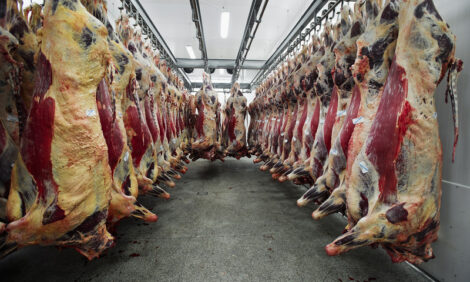



Beef, Pork Exports Continue To Grow In February
US - The positive trend for US beef and pork exports continued in February, with an increasingly large portion of total US production going to international customers while returning more revenue to America's red meat industry, according to statistics compiled by the US Meat Export Federation (USMEF).
For the month of February, 27 per cent of US pork production was sold outside of the United States with the incremental value of exports reaching $51.48 per head – versus 25.2 per cent and $43.81 last year. Total pork exports jumped 15 per cent in value and eight per cent in volume versus February 2010 totals.
At the same time, US beef exports in February accounted for 12.9 per cent of total production versus 10.6 per cent last year at this time, and the incremental value of beef exports per head of fed slaughter reached $182.12, compared to $126.50 last year. For the month, total beef exports were up 47.2 per cent in value and 25 per cent in volume over year-ago levels.
Pork exports
Exports of US pork in February reached 172,022 metric tons valued at $434.4 million. For the first two months of 2011, those totals are 337,160 metric tons valued at $831.3 million, increases of 11 per cent in volume and 17 per cent in value. Mexico, Japan, the Hong Kong/China region, South Korea and Canada remain the top five export markets.
The strength of US pork exports was seen across the board so far this year, with only two major markets – Mexico and the ASEAN region – showing any slippage from last year. In Japan, the leading value market for US pork, exports were up 19 per cent in volume and 17 per cent in value for the first two months of 2011 to 74,498 metric tons valued at $280.3 million. In addition, Japanese import data show the US market share increased to 45.5 per cent of all imported pork – up from 43.2 percent a year ago.
Philip Seng, USMEF president and CEO, commented: "The trend in Japan, as it is in a number of other Asian countries, is toward increasing reliance on imported foods to meet domestic needs. It is critical for the US to maintain a strong presence in markets like Japan, where consumers are willing to pay for high-quality products. This year, 22 nations are exporting pork to Japan in competition for this valuable export market."
In Mexico – the top export market in volume – the modest five per cent decline in export volume and three per cent slip in value from year-ago levels is understandable as higher US pork prices limit growth potential. Even at that, exports to Mexico for the January-February period stand 71 per cent higher in volume (94,883 metric tons) and 95 per cent higher in value ($168 million) than the global record year of 2008.
The growth leader for US pork exports in February was South Korea, which purchased a record 19,532 metric tons valued at $49.2 million as that nation continues to deal with product shortages driven by a major outbreak of foot and mouth disease (FMD). Monthly export totals to Korea jumped 154 per cent in volume and 227 per cent in value versus February 2010. For the first two months of 2011, South Korea has purchased 32,715 metric tons of US pork valued at $81.3 million – increases of 143 per cent and 198 per cent, respectively.
Other key pork export markets include:
- Hong Kong/China: down slightly (four per cent in volume and 9.4 per cent in value) for February, but still up 19 per cent in value ($81.5 million) and 22 per cent in volume (56,429 metric tons) for January-February versus 2010.
- Canada: essentially level compared to 2010, with two-month totals at 26,746 metric tons valued at $89.7 million.
- Central and South America: 11,128 metric tons (12 per cent increase) valued at $28.4 million (26 per cent increase) for the January-February period.
- Russia: 278 per cent increase in export volume and 406 per cent jump in value to 8,009 metric tons valued at $21 million for the two-month start of 2011. This is due in part to the limited market access for US pork in early 2010.
Beef exports
A similar trend has emerged in beef exports with strong growth across a diverse base of international markets. For the first two months of 2011, virtually every significant export market showed growth versus 2010 levels.
Exports of US beef in February reached 89,787 metric tons valued at $371.7 million. For the first two months of 2011, those totals are 179,460 metric tons valued at $727.3 million, increases of 24 per cent in volume and 45 per cent in value. Mexico, South Korea, Canada, the Middle East and Japan are the top five export markets.
Mexico leads the way in volume and value, importing 40,542 metric tons valued at $151.6 million, increases of three per cent in volume and 22 per cent in value over last year as this key market continues its rebound from the global economic slump that affected it more profoundly and for a longer period than many nations.
South Korea consumers continued to show their growing acceptance of US beef by boosting their purchases by 121 per cent in volume and 142 per cent in value for the first two months of 2011, reaching 28,150 metric tons valued at $120.2 million.
Mr Seng said: "The success we're seeing in South Korea for US beef is extremely gratifying. It wasn't that long ago that public sentiment was very unfavourable for US beef. But, with the support of Checkoff dollars and the USDA Market Access Program (MAP), we have devoted significant resources to an aggressive 'Trust' imaging campaign – now in its second phase – and proactive partnerships with prominent Korean retailers and food-service outlets. We're seeing the fruits of those efforts.”
According to the Global Trade Atlas, the gap between Australian beef exports to South Korea and those from the US has narrowed significantly over the past two years. In 2009, Australia's market share of Korea’s imported beef (based on value) stood at 51.8 per cent versus 33.9 per cent for the US. This year, Australia holds a narrow lead of 45.6 per cent to 42.6 per cent.
Other top US beef export markets include:
- Canada: up 15 per cent in volume and 33 per cent in value to 24,877 metric tons valued at $123.5 million for the first two months of 2011.
- Middle East: up 37 per cent in volume and 78 per cent in value to 20,856 metric tons valued at $45 million despite widespread unrest in the region. Egypt once again proved its mettle as a mainstay market for US beef, with increases of 30 per cent in volume (16,511 metric tons) and 78 per cent in value ($25.9 million), overcoming an uncertain period in which the government was in transition and economic activity was temporarily stalled.
- Japan: despite continued market access limitations – only accepting beef from cattle 20 months of age and younger – up 75 per cent in volume and 81 per cent in value to 20,359 metric tons valued $106.2 million.
Lamb exports
Exports of US lamb continue to be higher in volume but lower in value versus year-ago levels. Two-month totals show 2,621 metric tons exported (25 per cent increase versus 2010) valued at just under $4 million, a 10 per cent dip. Mexico, Canada and the Caribbean are the top export markets.
TheCattleSite News Desk


